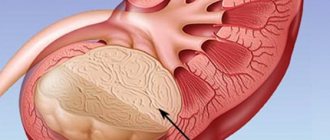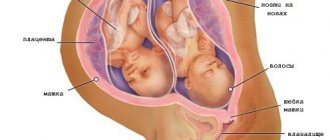The best age for pregnancy from a medical point of view
The optimal time for pregnancy and childbirth from the point of view of medical science is up to 30 years. During this period, the female body functions well, the menstrual-ovulatory cycle is established, and the hormonal balance is stable. Hormones directly affect the possibility of conception and the development of pregnancy. Whether pregnancy will proceed normally depends on their stability. The energy and vitamin resources of a young woman ensure rapid recovery after childbirth (this applies to muscle and vascular tone, psycho-emotional state).
The body of a girl slightly older than 20 years old is much stronger and more resilient. The muscle corset provides effective pushing. The likelihood of complications during pregnancy and childbirth is several times less.
After 30 years, women experience depletion of the ovarian reserve - the number of eggs that can subsequently produce healthy children progressively decreases and therefore the likelihood of successful conception and pregnancy also decreases. After 30, the body noticeably decreases the amount of substances that ensure the elasticity of connective tissue structures (muscles, skin, cartilage). At this age, pregnancy is more difficult to bear, and the mother recovers more slowly.
Pregnancy after 35 years is associated with risks. In particular, the likelihood of a child developing with abnormalities due to genetic mutations is increased. Eggs are negatively affected by various factors (smoking, alcohol, taking potent medications, sexually transmitted infections, etc.) throughout a woman’s life.
The later they are “used” for conception, the greater the likelihood of a “breakdown” in the genetic apparatus of the unborn child. Pregnancy after 35 years is considered late.
Practicing gynecologists strongly recommend that girls plan a pregnancy between the second and third decades of life. They believe that the closer a girl is to 20 years old, the greater the chances of successful pregnancy, childbirth and motherhood.
At what age should pregnancy be considered early?
The first menstruation (menarche) is evidence that the girl has moved to a new level of physiological development, becoming a girl who is already at this stage capable of becoming a mother.
Most often, menarche occurs in 12-13 year old girls, although in some cases it occurs in the age range from 9 to 17 years. There are, however, exceptional cases of excessively early puberty in girls who became mothers at 9, at 7 and even... at 5 years old!
The smallest mother on the planet
The youngest mother in the history of mankind was Peruvian Lina Medina, who gave birth to a healthy full-term boy 4 months before her sixth birthday. Surprising as it may seem, in terms of physiological maturity, this baby was quite ready to bear a pregnancy.
The fact is that her menarche occurred at 8 months of age, and the condition of the mammary glands and genital organs by the age of 4 was quite consistent with the level of development of a young healthy woman. Doctors suggest that such early physiological development was a consequence of the fact that this girl was a carrier of premature aging syndrome (progeria).
The child she gave birth to was born by caesarean section (the girl would not have been able to give birth naturally due to an underdeveloped pelvis) in 1934, was completely healthy and lived to be 40 years old.
Lina gave birth to her second child 38 years later, already a married woman. She is alive to this day, but not a single journalist has been able to find out the name of the father of her first baby.
Why early pregnancy is undesirable
In modern society, pregnancy occurring before the age of 18 is considered early. Why do doctors not recommend giving birth before this age?
- The process of active formation of the girl’s body has not yet been completed. Instead of the body completing its maturation, all efforts are thrown into the successful course of pregnancy. As a result, the fetus does not receive enough necessary substances, and the young organism becomes very vulnerable to adverse environmental factors.
- The psyche of a teenage girl is also in the development stage. Although physiologically mature, she is not yet psychologically ready to have and raise a child.
- Early pregnancy is fraught with miscarriages and serious complications, the consequences of which a woman will have to deal with throughout her life.
- Children born to mothers who are too young are often underweight.
- In early pregnancies, there are frequent cases of pathologies during the period of intrauterine development of the fetus.
- Young girls, due to their carelessness, take their health lightly. They often find out about their pregnancy when it is too late to take any steps to terminate it. Therefore, even if serious pathologies are discovered in the development of the fetus, they have to give birth to sick children, which they subsequently abandon.
- The financial situation of a young mother, as a rule, does not allow her to provide a decent standard of living for herself and her child, so taking care of them falls on the shoulders of grandparents.
Opinions of sociologists and psychologists about the best age for pregnancy
From a psychological point of view, a woman becomes ready for motherhood at the age of 35. Psychology specialists mean the psycho-emotional state of a woman. By this age, she “ripes” for the measured life of a mother, willingly accepts responsibility, and more easily endures any restrictions associated with a new responsibility.
As a rule, by the age of 35, women decide on their personal life and career. Confidence in a partner increases the desire for a child. Material stability in the future contributes to inner peace. Older mothers have experience communicating with other children, have heard a lot about the rules of care, readily assimilate new information, and are more selective about it.
When is the best time to get pregnant?
Gynecologists set the optimal age for conception, pregnancy and childbirth from 22 to 26 years. This is the time in which a woman blossoms and is fully formed, she has all processes under control and is ready to give birth to a healthy child.
There is no need to despair if you give birth a year earlier or later, doctors have already proven that completely healthy children are born at an early and late age, but we must not forget that pregnancy is a complex process, it is stress for the female body. Therefore, you need to think carefully about everything before deciding to get pregnant, so you will not harm yourself and your unborn baby.
So, to the question at what age you can get pregnant, there is one answer immediately after the female body is fully formed; this happens individually for everyone and abnormal phenomena often occur. But you need to remember that the body must not only be formed for pregnancy, but also completely ready for it, which is why it is so important to plan it, think everything over carefully, check your health so that you have a healthy baby and you remain a healthy mother .
Features of early pregnancy
At a young age, women have no (or almost no) chronic diseases.
Muscles, skin, ligaments, cartilage at this age are very elastic. This minimizes the likelihood of birth injuries. Even girls with a narrow pelvis can successfully give birth on their own - the cartilaginous joints of the womb stretch, allowing the baby's head to pass through. Due to the inflated abs and toned pelvic floor muscles, the baby moves more easily through the birth canal.
The first birth of young girls is much faster than that of older women. After them, young mothers quickly recover. With active metabolism, tears and sutures heal quickly, muscles contract and tighten. It is easier for a woman to lose excess weight.
However, pregnancy at 18-25 years old often becomes unexpected news for the expectant mother. As a rule, at this time, girls are busy studying or actively working on the material aspect of their own lives.
Thus, having a child at a period of physical maturity has a number of advantages:
- the chances of having a healthy baby are higher;
- pregnancy is easier;
- labor proceeds faster;
- the body is restored in an accelerated manner (injuries heal, weight, skin turgor, and hormonal levels are normalized);
- there is time to think and plan a second pregnancy;
- the young mother will still have time to make a career;
- relationships between children and young parents are closer.
Pregnancy in adulthood
There is a category of women who, due to certain circumstances, were unable to have a child at an age considered optimal for motherhood. The great desire to have your own baby only intensifies over the years, and the instinct to procreate fills the consciousness of an unfinished female mission.
By a certain age, a woman who does not have children begins to feel the desire to bring them into the world more and more acutely. The implementation of her plans often pushes her to rash actions and forces her to neglect precautionary advice. For a woman over 35 years old, not to mention the older category, it becomes more difficult to give birth to a child due to certain risks, especially if we are talking about the first child:
- Hormonal levels change, which affects the percentage of successful conception.
- Late childbirth can provoke pathology in the expectant mother, which will subsequently lead to unpredictable consequences.
- By this age, a woman may have a number of chronic diseases, the impact of which negatively affects bearing a child.
- Age-related changes in the body of a mature woman may well affect the development of the gestating fetus.
Motherhood is the main mission of a woman, which almost every representative of the fair half of humanity wants to fulfill sooner or later. But it often happens that one is in too much of a hurry to conceive, while the other, on the contrary, puts it off. The rule of the golden mean and the experience of previous generations make it possible to decide exactly at what age you can get pregnant so that carrying a child and its birth goes without complications.
Features of late pregnancy
Pregnancy after 35 years can intensify the exacerbation of chronic diseases, so if a woman still suffers from some ailments, her health needs to be “improved” before conception.
The likelihood of complications during pregnancy and childbirth is higher than for younger girls, especially if this late pregnancy is the first.
The positive aspects of late pregnancy include the following:
- in women after 35 years of age the maternal instinct is more developed;
- they make the formation of lactation easier;
- they are less likely to experience postpartum depression;
- There are many studies in favor of the fact that children in mature families develop faster and more comprehensively.
If in young girls maternal feelings are fully revealed a few months after childbirth, then in adult women this happens even during pregnancy
Records for age of pregnancy and childbirth
Very often you can see facts that truly amaze both people and doctors, because it seems that such age categories cannot become pregnant, much less give birth. The youngest mother is a 5-year-old girl, about whom we already wrote above. But women aged 70 are considered the oldest mothers. If a young body can clearly give birth and bear a child, then adulthood is truly an anomaly. In a woman, menopause occurs after 50 years, menstruation completely ends, and eggs that can be fertilized are no longer formed.
Of course, cases of both early and late pregnancy are not the norm, which means that a very strong failure has occurred in the female body, and of course this will also affect the child. A little girl will not be able to raise him normally, and a 70-year-old woman will also not give a full-fledged upbringing to the child.
When is the best time to have your first baby?
What is the best time to have your first child? There is no definite answer to this question. All women develop differently and have different physical and mental health characteristics. Doctors consider the optimal time interval for the birth of a first child to be between 21 and 28 years old.
Young women after 30 years of age are gradually approaching the phase of inevitable decline of reproductive function, so this age is not the most preferable for conceiving the first baby. Despite the recommendations of gynecologists regarding the optimal time for the birth of their first child, a married couple should make a decision on this taking into account the following factors:
- health status of the expectant mother;
- moral readiness of spouses for parenthood;
- strength of marital relationships;
- financial stability.
The ideal age for childbirth for each woman is determined by many factors. In any case, planning a child must be agreed with your doctor. The gynecologist may advise one patient to give birth to a baby as soon as possible, while another may recommend postponing this event for a certain time.
The question of the best age for the first pregnancy is highly controversial. Experts have different opinions on this matter. In gynecology, it is generally accepted that the optimal age is between 20 and 25 years.
In the West, the boundaries regarding this topic are blurred. There it is believed that a woman should be fully developed as a person. This implies career success, financial stability and a mature outlook on life.
. In this case, the following factors are of great importance:
- The woman's health status.
- Moral readiness to become a mother.
- Stability of family relationships.
- Availability of material resources.
If certain diseases occur, doctors recommend getting pregnant as quickly as possible. This is due to the fact that any deviation tends to progress. One of these diseases is polycystic disease. Its development is characterized by disruption of the menstrual cycle.
Menstruation, over time, may become scanty and painful. Ovulation occurs less and less often, and then disappears completely. Lack of treatment can lead to complete infertility. Surprisingly, the main way to get rid of the disease is conception.
We suggest you read at what temperature to bathe a newborn
REFERENCE! In gynecology, women who give birth for the first time at the age of 25 are considered old-timers.
How to minimize the danger?
You can give birth at 45. The main thing is to follow some rules that can significantly reduce the chances of miscarriage, freezing of the fetus in the womb, or the occurrence of genetic disorders. The first thing to do is to carefully plan your pregnancy and prepare for it mentally and physically. A woman should visit a gynecologist: let him rule out the presence of diseases and infections, and also provide advice.
The baby's organs are formed in the first trimester, so six months before conception, the expectant mother is simply obliged to fall in love with a healthy lifestyle. Namely: give up fatty, smoked, canned foods, introduce a lot of greens, fruits and vegetables into your diet, quit smoking, forget about alcohol and coffee. It is recommended to take a complex of vitamins prescribed by a doctor, exercise, walk a lot and sleep 8 hours a day - this will also increase the likelihood that a woman will quickly become pregnant, carry her to term without problems and give birth to a healthy baby without complications.
What are the consequences of late pregnancy for mother and child?
If a woman was not treated for infertility, then, most likely, conception was delayed due to her unwillingness to become a mother. For example, a girl who has just graduated from university is in no hurry to burden herself with a house and pots. She wants to go to work, make a career, become successful and self-sufficient, and only then have a husband and several children.
Other reasons for late pregnancy can also include: the availability and accessibility of safe methods of contraception, advanced methods of treating complications during pregnancy. A woman does not ask the question: “When can I give birth?” She is confident that modern technologies will help her become a mother at almost any age.
Social factors
Physiology
With the appearance of menstruation, pregnancy may already occur, but the body itself at this age is not yet ready for such a load. There is a risk of complications on the kidneys and heart; natural childbirth may be impossible due to improper divergence of the pelvic spines.
Full development ends by age 18. But after 25 years of age, the body begins to age. Progesterone levels decrease. Testosterone, on the contrary, increases, and this risks not carrying the child to term.
Total - physiologists for 20-25 years.
Psychology
Childbirth requires changes in your usual life for the well-being of the baby. A lot of girls who decide to give birth are not psychologically ready for this. Later, this may result in dislike for one’s own child, complaints against him, or result in depression of the young mother and poor relationships in the family.
Only after gaining the necessary social experience and passing (preferably) a readiness test can you become parents.
We invite you to familiarize yourself with Baby food for newborns. Which mixtures are better? Reviews, ratings, testimonials, prices, listings without palm oil and goat milk
Total – 24-27 years.
Sociology
The little man not only needs the care and love of his mother, he also needs clothes, medicine, diapers, toys and many other useful things. Nowadays, all this is not so cheap.
So first, it is important to decide on a permanent place of work and earn authority there in order to have reliable financial support for caring for a small family member.
Total – 25-28 years.
You can have a baby when you can feed him, buy nasal drops, diapers and a minimum set of toys. A child does not need a three-story villa - he needs caring, loving parents. Material wealth takes a long time and is difficult to acquire, but can be easily and quickly lost.
Future mothers and fathers will feel more confident if, by the time the child is born, they already understand that their education, specialty and existing experience are in demand by society, that is, show a certain social result. In our country this is clear already by the age of 23-25.
The presence of grandparents who are supposedly always ready to help should not be a decisive social factor for the birth of the first child, since grandparents do not always live up to expectations.
In a situation with a second child, the help of a grandmother who has proven herself well with the first-born can be a significant pushing factor - to have time to give birth to the second while the grandmother is still young and can help.
READ ALSO: The role of grandparents in raising children
The rules for giving birth to a second child are not much different from the rules for the first, with the only difference being that a woman’s body takes about 3 years to recover after childbirth. However, this particular age difference between children is rare.
Usually parents prefer to either “shoot back quickly”, i.e. give birth at the same age in order to quickly survive all the difficult moments of early upbringing, or, on the contrary, they wait until the first child reaches school age.
Both approaches with pros and cons.
Until what age can a woman become pregnant?
Our calendar describes the development of a child in the first three years of his life, basic skills, abilities, and physical development.
Answering the question: at what age is a girl ready for pregnancy, we can note the fact that you can get pregnant from 12 to 50 years old, but the ideal age for pregnancy is considered to be 20-35 years old.
In our article we will talk in detail about folk methods of conceiving a daughter and medical ones using IVF, blood renewal and ovulation.
Couples who have not had children for a long time are often interested in the age at which a woman can become pregnant, safely carry and give birth to a healthy baby. In the age of developed medicine, the concepts of “giving birth late” or “getting pregnant early” are becoming arbitrary, especially if this is an obsessive desire.










